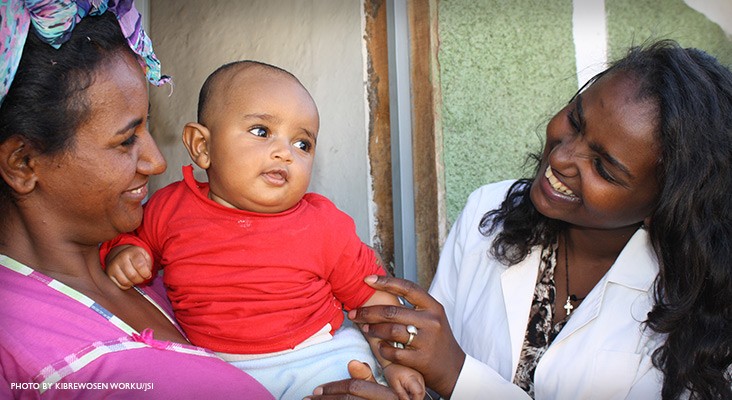
On February 4th the Association for Women in Boldness (AWiB), held its monthly event under the auspices of “Ethiopian Health; what’s at stake” at Hilton Hotel in Addis Ababa. The panelists for the discussion were Dr. Daniel Bursa, a senior adviser to the Minister of Health, Dr. Tewabech Bishaw, a public health specialist that has been active in the public health sector for more than 40 years, Yasmin Wohabrebbi, the External Economic Cooperation State Minister, and Dr. Tinsae Alemayehu, a pediatric diseases specialist at Tikur Anbessa Hospital and Deputy Medical Director to the American Medical Center.
Sponsored by LonAdd Consulting and Waryt Furniture, the event focused on the major healthcare issues that the country faces especially in terms of accessibility, quality service, funding, and reforms. Addressing the issue of the direction in which healthcare reform is headed in Ethiopia, Dr. Daniel noted that figures related to infant and maternal mortality rate show promising prospects for the country.
The reduction of maternal mortality rate from 781 to 401 per 100,000 since the year 2000, for instance, indicates that the country is headed in the right direction. He also noted, however, that these numbers are still abysmal, especially when considering that the majority of adverse conditions are prevalent in rural areas than they are in cities. One of the major aspects that needs reform according to the panel is the discrepancy in healthcare services between rural areas and cities.
Dr. Daniel affirms that discrepancies between cities and rural areas are going to be addressed in the five year and ten year transformation plans currently being implemented by the government. These plans are primarily going to center around addressing issues related to primary healthcare and the growth being observed in the prevalence rate of non-communicable diseases such as heart disease, diabetes, high blood pressure etc.
An important aspect in terms of addressing these issues is the private sector. According to Dr. Tensae, the biggest issue regarding the private sector is the lack of infrastructural resources especially healthcare centers and hospitals. He claims that a 2018 study found that there are only 290 hospitals in the country with only 41 being private and more than half located in and around Addis Ababa. This is further compounded by the funding issues that the healthcare sector keeps facing despite increases in budgeting, according to Yasmin.
One of the biggest funding issues raised by the panel is the fact that 33 percent of healthcare costs are still covered out of pocket. Only 31 percent is covered by the Ethiopian government with the rest falling on foreign grants and funds; an unsustainable fiscale model for any sector by any stretch of the imagination. Similarly, 21 percent of healthcare funds go to the private sector, but of this amount, 93 percent is covered out of pocket. Both Yasmin and Dr. Daniel told the audience that one of the measures currently being laid out to deal with budgeting and accessibility issues is the provision of universal medical insurance in the country.
Yasmin said that even now there is a healthcare insurance plan that is operational across 800 woredas, covering almost 6 million households. While a definite timeline has not been set yet, the government tentatively expects the insurance scheme to be made available to the rest of the population by the beginning of 2014 (EC).
The audience, however, was not as permissive to the problems that are prevalent in the healthcare system as much as the panelists were. During the question and answer section of the discussion, audience members took the panel to task, especially on quality and budgeting issues. Many noted that the panel’s assurance on budgeting especially sounded like the “hollow promises” that Ethiopian are used to hearing from the government. One audience member, Tirunefs Eneshaw, who claims to be a retiree from the healthcare sector, cited the fact that some municipalities in Ethiopia allocate less than 180,000 ETB per year for pharmaceuticals; an amount that barely covers pharmaceutical costs for 4 months.
Others raised issues like the cost of rent for private hospitals, the requirements for licensing like disabled ramps and the like that are difficult to put in place for small, private institutions, and even the deficiency in addressing basic issues related to quality like blood availability, nutrition, general health awareness, and even personal protective equipment (PPE). The fact that these issues were raised in a very public and uncompromising manner will hopefully serve as encouragement for others and drive the betterment of the healthcare sector.
Dr. Tewabech certainly thinks so. She told LinkUp Business that one of the major issues that the healthcare sector faces is perception. The perception of health as a separate aspect of society that is not ingrained in all of them is one that needs to be appropriately covered if there is to be any progress. This means that issues related to health have to depend on the general public as much as they are on the government and other healthcare institutions, with people exhibiting more awareness and participation in their own and their community’s health care policies.
